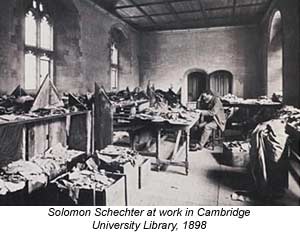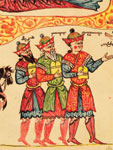The Iraq war has resulted in displacement of
2 million Iraqis (you may have to login to this opinion piece from the NY Times). It could mean the end of the presence of
Iraqi Christians and other minorities that have lived there for over two thousand years according to an article by Felice D. Gaer and Charles J. Chaput for the Washington Times (Dec 22, 2006).
Amid the widely publicized cycle of Sunni-Shi'ite sectarian violence in Iraq, members of non-Muslim religious minorities continue to suffer a disproportionate burden of violent attacks and other human-rights abuses. Minority communities, including Christians, Yazidis and Sabean Mandaeans, have been forced to fend for themselves, and are particularly vulnerable given their lack of a tribal or militia structure to provide for their security. The repeated targeting of Iraqi religious minorities in coordinated bombing attacks and other violence has forced many worshippers to cease attending religious services or participating in religious events. Moreover, they face a continuing climate of impunity.
As a result of these attacks, Iraqi ChaldoAssyrians and Sabean Mandaeans are fleeing Iraq in numbers disproportionate to their size. While they constitute less than 3 percent of the Iraqi population, they represent approximately 40 percent of those who have fled Iraq seeking refugee status over the past three years, according to the United Nations High Commissioner for Refugees (UNHCR). Numbering at least 100,000, these refugees are dispersed today in Jordan, Turkey, Syria, Egypt, Iran and Lebanon.
In the countries to which they have fled, their welcome is wearing thin. Iraqi refugees live in fear that they have no legal protection and no work opportunities in the countries where they have sought refuge, and are vulnerable to forced repatriation.The article's authors plead that the United States should create new or expand existing options, independent of UNHCR, for allowing members of Iraq's ChaldoAssyrian and Sabean Mandaean religious minority communities to access the U.S. refugee program. It should also urge UNHCR to assess all claims from Iraqi asylum seekers without delay.
Thousands of Iraqis are suffering and fleeing their country, and refugee protections should be available to all of them. Iraq's Christian and other religious minority communities are particularly vulnerable, and UNHCR, the United States and other nations must recognize their special circumstances and address their needs. Surely countries can make "room at the inn" for these vulnerable people so badly in need of help.
In an
OpEd piece for the LA Times (Jan 13, 2006), Anna Husarska describes the case of a Dinka man named Kur who had been proposed by the U.N. High Commissioner for Refugees for resettlement to a third country. His application — for himself, his wife Angelina and their six children — was submitted to the United States by the commissioner's office.
In the last six months, I have met many refugees around the world — Burmese Karen in Thailand, Burmese Chin in Malaysia, Lao Hmong in Thailand, Eritreans in Ethiopia — whose cases were put "on hold" by U.S. authorities because the organizations to which the refugees had belonged were later designated as terrorist. But I never saw a blunt refusal until I saw Kur's letter.
What's particularly upsetting is that those "on hold" are, in many cases, heroic freedom fighters who struggled for democracy against brutal dictatorships (like the Burmese junta or the Laotian communists) or even, sometimes, people who had been recruited to fight by the Unites States (like the Lao Hmong or the Vietnamese Montagnards).
The reason for this bizarre treatment is that in the aftermath of the 9/11 attacks, the U.S. adopted a very broad definition of "terrorist activity" in American law. This overzealous legislative approach means that thousands of genuine refugees who participated in armed insurgencies — even those friendly to (and in some cases supported by) the United States — are now treated as a threat to American security.
It's not just those who participated in the insurgencies. Those who provided "material support" to these combatants can be barred too. The global effect of this draconian law has been devastating: Of the 70,000 slots allotted in 2006 for new refugees by the traditionally hospitable U.S. resettlement program, only 41,000 were filled. According to estimates from the International Rescue Committee and other refugee organizations, about half of the 29,000 excluded were due to the "terrorist" and "material support" provisions.On Thursday, the Bush administration acknowledged the "unintended consequences" of the post-9/11 laws. Officials from the departments of Justice, State and Homeland Security announced plans to expand the waiver program, some of which will require a vote in Congress. The officials named in particular Cuban, Tibetan and additional Burmese freedom-fighter groups whose supporters and members could get special consideration for admission to the United States.
But the waiver program is a partial solution since it is time-consuming. Husarska concludes with a plea that Congress must act to broadly amend the immigration law so that all bona fide refugees can be easily and fairly considered for refugee or asylum status, not punished for the courage and commitment they demonstrated fighting for peace and democracy in their homelands.
Now from today's UK Observer comes an article by Ed Vulliamy,
"Welcome to the new Holy Land" about the dynamic effect on UK city RC churches of legal and illegal waves of immigrants.
He comments:
The burgeoning Catholic congregations are a sudden but barely discussed result of mass immigration and constitute a major moment in the complex history of the faith here. By tradition, British Catholicism had become a strange alliance - in counterpoint to, and often in defiance of, the Anglican establishment - between a refusenik aristocracy and intelligensia and the Irish masses, supplemented by a few Italians and Poles. But in the past decade, with European Union enlargement, British Catholicism has become a global village. The new faces of all colours not only revive the church but radically redefine it. Because the new communicants are strangers, mostly poor, often exploited and here illegally, the church becomes their home from home, obliged to rediscover that subversion innate to the faith here - for all its global power - since the crown and establishment split from Rome.What does it now mean to be a Roman Catholic in Britain? The demographic studies are not yet available.
At St. Peter's Woolwich, 75 nationalities, mostly from across Africa but also South America, Asia and Europe, comprise its congregation. On Advent Sunday there was an extended Mass featuring music and later food from 34 of them. This is where Monya the Rastafarian from Zimbabwe, with his locks and tri-coloured beads, takes communion along with the Filipino ladies who work on the ticket counter at Tower Bridge and in local hospitals. This church is where Cliff Pinto from Uganda met Eva Krejcarova from the Czech Republic. 'We were married here, and soon our child will be baptised here,' says Pinto, patting Eva's stomach. This is where the local Ghanaian community does its business in the church hall, while Hannah Mulvihill, who cleaned the local library at 6am every morning for 25 years, reflects, in her Irish accent: 'It was a full church but then the Irish died or went back to Ireland and it emptied. Then they all started coming. At first it was a bit... er, well, I'm not very good at expressing myself... But now it's lovely, having the church full again and these people from all over.'
Cardinal Cormac Murphy-O'Connor, Primate of the Catholic Church in England and Wales has emphasised the integration of the faith into British society. But last May Day he staged an extraordinary Migrant Mass at Westminster Cathedral after which he argued the case for the regularisation of undocumented migrants.
Archbishop Peter Smith of Cardiff is tipped to succeed him. The article continues by quoting him:
Gradually we need to integrate immigrants into the parishes, which means locating them, supporting them, helping them with registration. But the real priority is to get their children into our schools and educate them' - He is genial and hospitable but the lexicon of the man likely to lead the new tapestry of British Catholicism through its next phase is one of steel, echoing that of Pope Benedict and his predecessor, John Paul II: 'This is now a battlefield,' he says plainly, 'in a materialist society where many young people have no moral values at all, a society which does not allow a child to remain a child and which transmits rubbish whenever I turn on the TV. We face an aggressive secularism, imposing its values on people while accusing us of trying to impose ours. We are not imposing anything, we are proposing a way of life that challenges secular materialism and leads to physical, emotional and cultural as well as spiritual well-being, a just life for the common good.'Such immigrants will undoubtedly have a new and different voice on moral issues of our times once their immigrant status is resolved.







